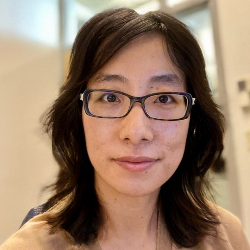Monday, September 28
7:30 am Registration and Morning Coffee
8:30 Welcome by Conference Organizer
Mimi Langley, MBA, Senior Conference Director, Cambridge Healthtech Institute
8:35 Chairperson's Opening Remarks

Krishnan Sampathkumar, PhD, Senior Director, Analytical & Drug Product Sciences, MacroGenics, Inc.
8:40 Predicting Antibody Developability Profiles Through Early Stage Discovery Screening

Laurence Fayadat-Dilman, PhD, Senior Director, Protein Sciences, Merck Research Labs
9:10 The Impact of Excipients and Oxidative Degradation on Protein Product Stability

Satish K. Singh, PhD, Head, Sterile Product Technology, Moderna Therapeutics, Inc.
Excipients in drug products fulfill a range of functions. In parenteral protein biotherapeutics, excipients provide physical and chemical stability, while contributing to osmolality. Excipients can however display complex behavior and under certain circumstances, may even destabilize the active protein molecule. Additionally, excipients may not be pharmacologically inert. Excipients must therefore be selected with care, and their control considered during development of the control strategy for the product.
9:40 Current and Emerging Expectations for R&D CMC Data Integrity

Nadine M. Ritter, PhD, President & Analytical Advisor, Global Biotech Experts LLC
- What kind of data integrity operational elements are appropriate for R&D vs. GxP labs?
- How can it be confirmed that everyone in the lab understands the rationale and justification of quality practices for R&D CMC labs?
- How can a regulatory affairs reviewer assure all of the R&D data included in a product dossier are in fact authentic, complete, accurate, etc.?
- What should be done if errors or omissions are discovered in key R&D CMC study reports?
10:10 PANEL DISCUSSION: Challenges in Ensuring Data Integrity in R&D and GxP Labs: Emerging Regulatory Policies and Best Laboratory Practices
Panel Moderator:

Nadine M. Ritter, PhD, President & Analytical Advisor, Global Biotech Experts LLC
- Which CMC data are at risk?
- How to ensure the R&D data are authentic, complete and accurate?
- What operational control mechanisms should be in place?
- What have been good vs bad experiences with R&D data integrity?
10:40 Networking Coffee Break
11:15 Analytical Method Development and Characterization Strategies for Early-Stage Novel Antibody-Based Molecules

Krishnan Sampathkumar, PhD, Senior Director, Analytical & Drug Product Sciences, MacroGenics, Inc.
Monoclonal antibodies and novel bispecific DART® molecules are being developed for a variety of indications including immune-oncology. Stage-appropriate and risk-based analytical control strategy needs to be developed to ensure product quality as molecules progress from early to late stages of development. This presentation will discuss analytical method development and high throughput characterization approaches during early stage of development using the above molecules as case studies.
11:45 Analytical Strategy for Early Cell Culture Development of Biotherapeutics

Rachel Chen, PhD, Scientist II, Analytical Development, Biogen
Accelerating early development of biotherapeutics to enable a fast timeline to first-in-human trials has been of interest across the industry. This presentation discusses the analytical strategies and opportunities to accelerate program development timelines while maintaining product quality, safety, and efficacy. These include establishing efficient characterization plan via prior knowledge, utilizing high-throughput assays and automation, and developing platform analytical methods and molecule-specific methods to meet product quality requirements.
12:15 pm Luncheon Presentation (Sponsorship Opportunity Available) or Enjoy Lunch on Your Own
12:45 Session Break
1:30 Chairperson's Remarks
Matthew Traylor, PhD, Principal Scientist, Mosaic Biosciences, Inc.
1:35 Candidate Selection from a Pool of Engineered Protease Constructs Using Fit-for-Purpose Analytical Methods

Matthew Traylor, PhD, Principal Scientist, Mosaic Biosciences, Inc.
A preclinical candidate was selected from a diverse pool of engineered protease constructs expressed in mammalian and bacterial hosts. Selection from this diverse pool required generic analytical methods and candidate ranking based on developability/QbD principles with an emphasis on production levels and intrinsic stability. Analytical methods were further developed as the program progressed with a fit-for-purpose approach based on performance monitoring and streamlined method verification.
2:05 High-Throughput Developability Platform to Screen Biotherapeutic Candidates for Biophysical and Biochemical (PTM) Liabilities

Amish Karanjit, Scientist, Denali Therapeutics Inc
Biotherapeutic developability assessment (DA) represent a new industry trend. At Denali, we apply a series of state-of-the-art analytical and biophysical technologies to carry out these molecular assessments as early as possible in the preclinical stage of development to select the candidate with the most stable profile. Here we present a case study where we use these techniques to characterize the biophysical stability of therapeutic proteins.
2:35 Sponsored Presentation (Opportunity Available)
3:05 Networking Refreshment Break and Breakout Discussions
4:30 Integrated Analytical Strategies in Developability Assessment for Complex Modalities

Guodong Chen, PhD, Research Fellow, Pharmaceutical Candidate Optimization, Research & Development, Bristol-Myers Squibb Company
Since the introduction of the first recombinant DNA-derived insulin in the 1980s and the launch of Interferons and Interleukins in the 1990s, the biotherapeutics market has shown steady growth. Given significant challenges in the treatment of many life-threatening diseases, biotherapeutics are becoming increasingly complex. Integrated analytical strategies are required to address potential issues in developability assessment for such complex molecules. This presentation will discuss recent developments in leveraging protein analytics for elucidating key aspects of molecular developability, including post-translational modifications and higher-order structure using examples encountered in bispecific antibodies and fusion proteins.
5:00 Early Implementation of QbD in Biopharmaceutical Development, and Practical Approaches to Biopharmaceutical Candidate Selection and Formulation Development

Danny K. Chou, PharmD, PhD, President, Biopharmaceutical Characterization and Formulation Development, Compassion BioSolution, LLC
Early developability assessment of biopharmaceutical drug candidates, using rational methodologies and computational methods, can assist in reducing stability risks during development in a cost-effective way. In this presentation, the author will discuss one potential algorithm to illustrate how developability strategies can be introduced in practical terms during early protein drug development in order to mitigate risks, and ultimately increase the robustness of the biopharmaceutical.
5:30 Close of Day One and Dinner Short Course Registration
6:00 Dinner Short Courses
SC1: Particles in Biotherapeutics: Characterization & Impact
SC2: Advanced Analytical Technologies for Developability & Formulation Assessments
Tuesday, September 29
8:00 am Morning Coffee
8:30 Chairperson's Remarks
Lisa A. Kueltzo, PhD, Director, Formulation & Stability, Vaccine Production Program Lab, NIH NIAID
8:35 Parallelism and Risk in Early Formulation Development: Strategies and Case Studies

Lisa A. Kueltzo, PhD, Director, Formulation & Stability, Vaccine Production Program Lab, NIH NIAID
“First in human” biologic programs often rely upon rapid development of GMP suitable process, analytics and formulation, to reach Phase 1 trials as quickly as possible. Complex programs, (co-formulated therapeutics, multi-valent vaccines) can require parallel development of multiple components. This talk discusses potential risks of parallelism in early stage development, specifically formulation, analytical and stability challenges that arise and strategies to overcome them.
9:05 Evaluation and Implementation of Automated Buffer Exchange for Early-Stage Formulation Development

Huan Kang, PhD, Development Scientist I, Alexion Pharmaceuticals
Buffer exchange is a critical step during formulation development, involving exchange of buffers and concentration of protein solutions utilizing a membrane-based system. However, the process is labor-intensive and time-consuming, requiring multiple cycles of manual buffer refills and mixing. In this study, an automated buffer exchange workflow in a 96 well format is implemented using Big Tuna and evaluated using a model protein. The efficiency of the buffer exchange process is evaluated by such parameters as volume, osmolality, and pH of the prepared protein solution. The quality attributes of the exchanged protein solution are examined by multiple biophysical and analytical approaches, e.g., DSC, DSF, SEC-HPLC, and DLS. Moreover, the samples prepared by this process are compared to those made by standard dialysis process in terms of quality, materials requirement, and efficiency. Implementation of automation enables early-stage, high-throughput formulation screening in a timely manner. Application of automation in early formulation development in conjunction with DOE could become a valuable alternative to platform formulations, especially for more challenging protein scaffolds.
9:35 Sponsored Presentation (Opportunity Available)
10:05 Grand Opening Coffee Break in the Exhibit Hall with Poster Viewing
10:45 Analytical Challenges with Complex Modalities in Developability Assessments

Sarah Auclair, PhD, Scientist, Developability & Preformulation Sciences, Sanofi
Determining the development risk of an IgG1 mAb therapeutic is relatively straightforward. However, multi-specific antibodies, Fc-fusion, Fab, or other novel modalities can present many analytical challenges. As more complex modalities enter the biologics drug development landscape, developability assessments must remain flexible to address the challenges that they exhibit. This talk will highlight several case studies where biophysical characterization has been instrumental in determining risk.
11:15 Challenges and Mitigation in Early-Stage Formulation Development of Biologics

Yongmei Wu, Principal Scientist, Drug Product Science & Technology, Bristol-Myers Squibb Co.
The presentation will focus on major challenges in formulation development, analytical method development and stability assessment of biologics drug candidates in early phase clinical trials. Mitigation strategies used to stabilize the biologics will be discussed. Close collaboration of formulation scientists and analytical scientists are essential to ensure quality and successful product development within aggressive timelines. Case studies will be included in the presentation.
11:45 Early Prediction of Particle Formation in Protein Formulation during Long-Term Storage

Ying Wang, Assistant Professor, Chemistry, University of North Carolina Wilmington
In biologics formulation development, particle formation in protein solutions is often monitored over 2-3 years. During long-term storage under refrigerated conditions, therapeutic proteins in liquid formulations can form particles after a lag-time ranging from days to over a year. This type of particle formation is often of the nature of crystalline aggregation and not predicted by protein structural stability assays. Early assessment of the risk of particle formation during storage is highly desirable for developability evaluation and pre-formulation development. Based on the fundamental relationship between protein crystallization and liquid-liquid phase separation, we have developed a method to predict the thermodynamic condition for crystalline particle formation in monoclonal antibody solutions. This method provides an efficient means to quickly evaluate protein solubility with low sample assumption and is especially useful for the early development of concentrated therapeutic protein formulations.
12:15 pm Close of Early Analytical Development of Biotherapeutics